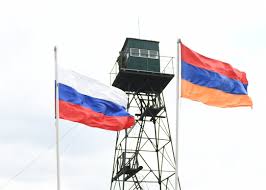The decision for Russia to withdraw its troops and border guards from Armenia’s border with Azerbaijan comes as a surprising shift in security dynamics, particularly considering the strategic importance of these forces in safeguarding Armenian territories, notably in the aftermath of the 2020 Nagorno-Karabakh conflict. Prime Minister Nikol Pashinyan’s negotiations with President Putin seemingly overlook the precarious security situation Armenia faces, especially given the persistent tensions with Azerbaijan.
Initially deployed at the request of the Armenian government to bolster defense capabilities in vulnerable border regions, the presence of Russian military personnel was seen as a crucial deterrent against potential Azerbaijani incursions. However, the abrupt decision to withdraw these forces raises serious concerns about Armenia’s ability to protect its borders effectively. The move signifies a significant shift in regional power dynamics, potentially leaving Armenia exposed to renewed threats from its neighbors.
While Pashinyan may assert that the changed conditions no longer warrant Russian military presence, the reality on the ground suggests otherwise. The volatile situation in the South Caucasus demands a continuous and robust security apparatus, which Armenia alone may struggle to maintain. Furthermore, the removal of Russian border guards from key locations like the Zvartnots international airport raises questions about Armenia’s capacity to manage its own security infrastructure adequately.
The Kremlin’s confirmation of the withdrawal underscores the broader geopolitical calculations at play, potentially leaving Armenia in a vulnerable position. The decision also highlights the complex interplay between Armenia’s strategic interests and its relationship with Russia, with Moscow’s acquiescence to Pashinyan’s request potentially signaling a recalibration of Russia’s regional priorities.
Moreover, the insistence on maintaining Russian border guards along Armenia’s frontiers with Turkey and Iran underscores the lingering security threats facing the country. While Pashinyan may project confidence in Armenia’s ability to handle border control independently, the reality is that the absence of Russian support could leave significant gaps in Armenia’s security architecture.
Critics have warned that Armenia risks undermining its long-term security and economic development by alienating its key ally. The Russian military base in Armenia serves as a cornerstone of the country’s defense strategy, and any attempts to curtail Moscow’s influence could have far-reaching repercussions. The warning from the Russian Foreign Ministry about potential damage to bilateral relations underscores the delicate balancing act Armenia must navigate in its dealings with Moscow.
To put it simply, while Armenia may seek to assert its sovereignty by demanding the withdrawal of Russian forces, the repercussions of such a decision could prove detrimental to its security interests in the volatile South Caucasus region. The removal of Russian troops and border guards signifies a significant shift in Armenia’s security calculus, with potentially far-reaching consequences for its stability and territorial integrity.




